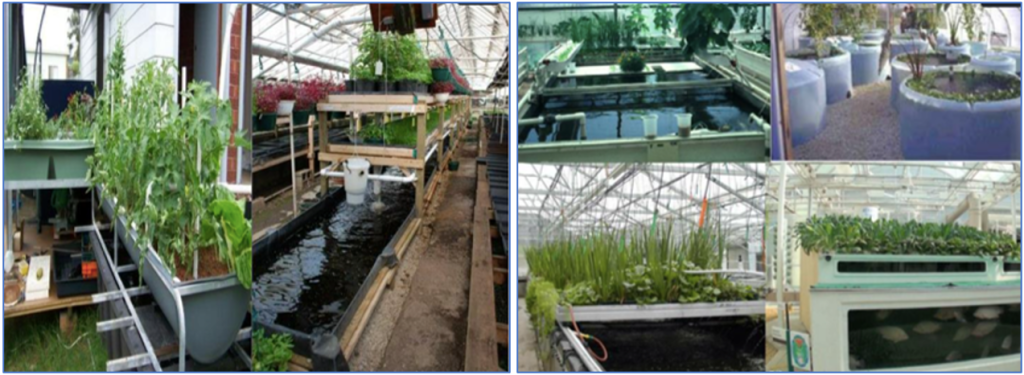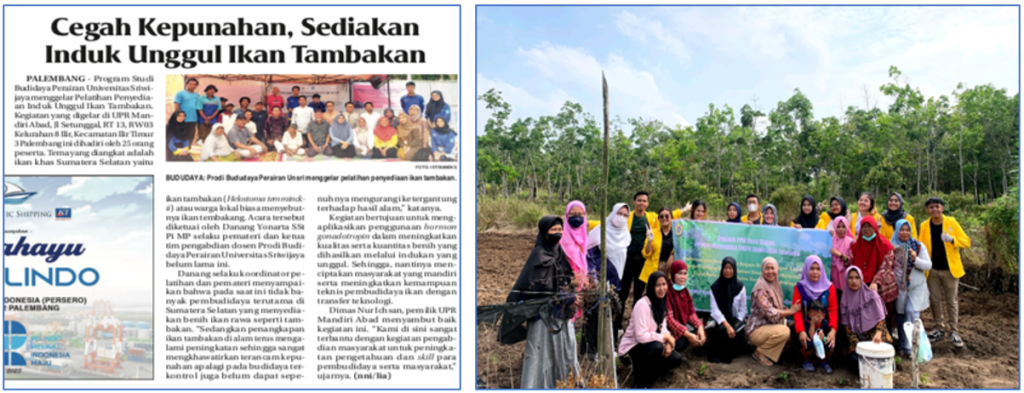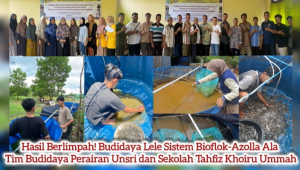
SDG 17 – Indicator 17.4.1 Education for SDGs commitment to meaningful education
Universitas Sriwijaya is committed to providing education focused on the Sustainable Development Goals (SDGs). One of the collaborative programs conducted by Universitas Sriwijaya is the cooperation between the Aquaculture Study Program and the Khoiru Ummah Tahfiz School, actively participating in developing fish farming innovations in the swamp areas of South Sumatra, including Palembang. The collaboration involves developing a biofloc catfish farming business using swamp probiotics, up to the production of seasoned frozen fish ready to cook.
The collaborative activities of Universitas Sriwijaya are implemented through Field Practice for students, which is a compulsory course in the curriculum of the Aquaculture Study Program at the Faculty of Agriculture, Sriwijaya University. In addition to involving students, this activity also engages alumni in field practice and the application of research results.
The purpose of students’ academic activities integrated into research innovation applications is to solve societal issues, which are also part of the Sustainable Development Goals, including:
- Eradicating poverty
- Ending hunger
- Responsible consumption and production
- Protecting aquatic ecosystems
The implementation of demonstration plots at the Khoiru Ummah Tahfiz School grounds and in the surrounding community yards is expected to improve community welfare and serve as a model area for those who are already engaged in fish farming as well as for those interested in developing fish farming.
Link:
SDG 17 – Indicator 17.4.2 Education for SDGs specific courses on sustainability
Universitas Sriwijaya commitment to sustainable development is implemented within the curriculum of its study programs. Increasingly complex global challenges in environmental, economic, and social fields compel Universitas Sriwijaya to adapt swiftly and remain relevant by promoting Education for Sustainable Development Goals (SDGs). Universitas Sriwijaya aims not only to produce knowledgeable graduates but also to foster awareness of the importance of sustainability across various fields. Special courses on sustainability integrated into study program curriculum are designed to impart the concepts, skills, and attitudes necessary to achieve the SDGs.

Course or program focused on sustainability offers in-depth insights into key issues such as climate change, zero waste, natural resource conservation, and the green economy. One example of a sustainability-oriented course is Integrated Aquaculture, which employs the Integrated Multi-Trophic Aquaculture (IMTA) system. IMTA is a more complex form of integrated fish farming, where multiple aquatic species from different trophic levels are cultivated together to enhance productivity and reduce environmental impact. In the lectures provided, students not only gain theoretical understanding but are also encouraged to think critically, creatively, and innovatively in addressing sustainability challenges. With the integration of the SDGs into the curriculum, it is hoped that course participants will become change agents capable of contributing to the achievement of the SDGs across various sectors.
SDG 17 – Indicator 17.4.3 Education for SDGs in the wider community
Universitas Sriwijaya is present and contributes not only to the fields of education and research but also provides a tangible and beneficial impact on the wider community, particularly those living around the university. One of the programs aimed at the community is the “Fostered Village Program,” designed for financially disadvantaged communities.
Various research outcomes from Universitas Sriwijaya are implemented within the broader community, especially in Fostered Villages. For example, in the agricultural sector, assistance is provided for implementing vegetable fertilization using Eco Enzyme with a balance of ingredients based on simple mathematical patterns in Pulau Semambu Village, Indralaya. In the fisheries sector, support is provided for the production of “Tambakan” fish, a local fish species from South Sumatra that can be cultivated as a source of income for fish-farming communities.
Universitas Sriwijaya offers solutions for communities with limited knowledge who rely on diverse individual skills without having proper technical guidelines as field references. Enhancing knowledge and providing technical training to the community has been proven to increase production and income, thereby alleviating poverty and improving community welfare.

Link:
SDG 17 – Indicator 17.4.4 Sustainable Literacy
The Learning Development and Quality Assurance Institute (LP3MP) at Universitas Sriwijaya will begin conducting a survey on Sustainability Development Goals (SDGs) literacy among all Sriwijaya University students at the end of 2024. Moving forward, this survey will be conducted each semester to assess and evaluate students’ understanding of and commitment to key sustainability concepts. The survey results will be processed and analyzed to determine the level of students’ comprehension of the SDGs concepts. The university will organize socialization sessions and workshops for students who have not yet fully understood the SDGs concepts. Students are expected to actively participate as agents of change capable of contributing to the achievement of SDGs across various sectors.
Link Survey: https://bit.ly/SustainabilitySurvey24

